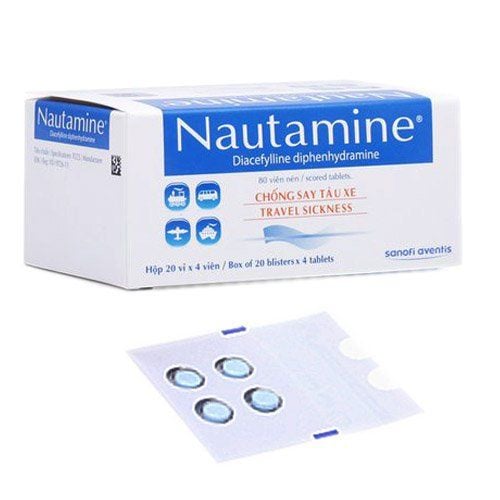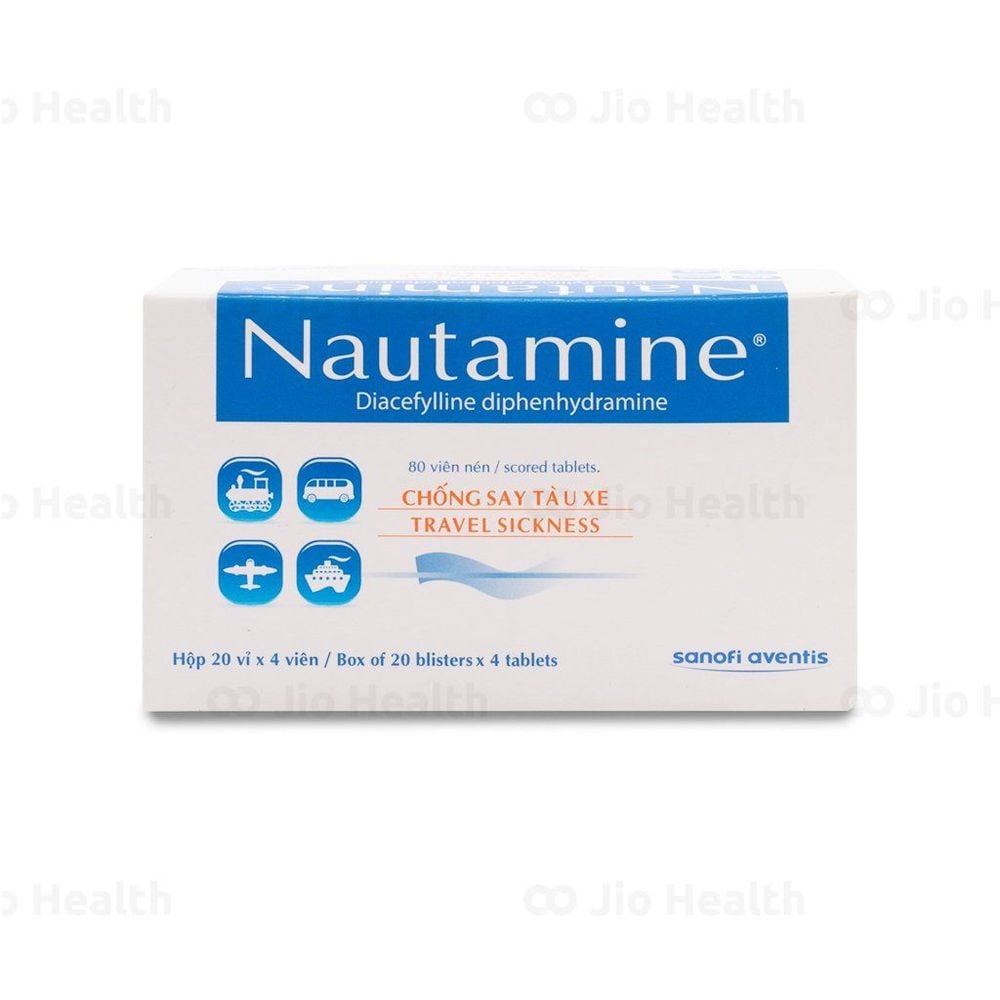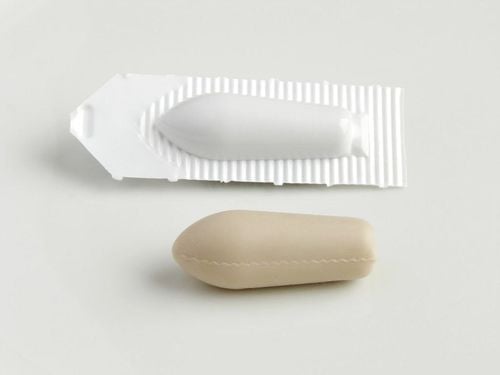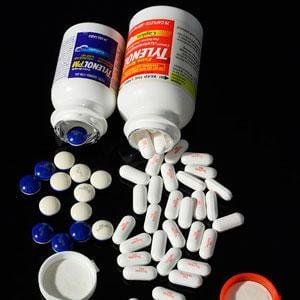Nautamine is a familiar drug found in most pharmacies nationwide. However, many people still wonder what Nautamine is used for. This article will provide you with some general information about this medication.
1. What are the ingredients of Nautamine?
The ingredients of Nautamine include:
- Active ingredient: Di (acefylline) Diphenhydramine 90mg.
- Excipients: Avicel, Sodium starch glycolate, Indigo carmine, Sodium lauryl sulfate, Colloidal anhydrous silica, and Magnesium stearate.
The active ingredient, Diphenhydramine, is an ethanolamine antihistamine with anticholinergic and sedative effects. The mechanism of action of Diphenhydramine is the competitive inhibition of histamine H1 receptors.
Diphenhydramine is well absorbed when taken orally. Oral bioavailability is 61 ± 25%. Peak plasma concentrations are reached 1-4 hours after oral administration, and the elimination half-life is 8.5 ± 3.2 hours. The effects of Nautamine can last about 4-6 hours.
2. What is Nautamine used for?
Due to its effects on the central nervous system, Nautamine is used to prevent and treat motion sickness in adults and children over 2 years old.
3. How to use Nautamine?
Nautamine is only for adults and children 2 years of age and older. It should be taken with a sufficient amount of water and 30 minutes before traveling. The specific dosage for each age group is as follows:
- For adults or children over 12 years old: Take 1-1.5 Nautamine tablets at a time and repeat after 6 hours if necessary, do not exceed 6 tablets per day;
- For children from 6 to 12 years old: Take 1 Nautamine tablet at a time and repeat after 6 hours if necessary, do not exceed 4 tablets per day;
- For children from 2 to 6 years old: Take 1/2 a Nautamine tablet, which can be crushed and mixed with a little water for the child to drink. Take 1/2 tablet at a time and repeat after 6 hours if necessary, do not exceed 2 tablets per day.

4. What are the contraindications of Nautamine?
Nautamine should not be used in the following cases:
- Children under 2 years of age;
- Patients with glaucoma;
- Patients with difficulty urinating due to prostate disease or other causes;
- Allergy to antihistamines.
5. Side Effects
Central Nervous System Side Effects:
Diphenhydramine can cause adverse effects on the central nervous system, including daytime drowsiness, fatigue, and memory impairment. Additionally, the drug may induce excitatory effects such as restlessness, agitation, insomnia, especially in children. In overdose, infants and children commonly exhibit neurological excitation including convulsions prior to progressing to coma. In adults, the depressant effects including drowsiness and coma are most commonly observed in overdose situations. The mechanism of these side effects is due to the drug crossing the blood-brain barrier and blocking the neurological effects of histamine at central H1 receptors. These effects are dose-dependent and can occur soon after a single dose.
Anticholinergic Effects:
- Diphenhydramine may cause symptoms such as blurred vision, tachycardia, nausea, constipation, urinary retention, agitation, confusion, cognitive impairment, delirium, etc. Elderly patients are at higher risk of experiencing these side effects. These effects are dose-dependent and related to the antimuscarinic pharmacological properties of the drug.
Allergic Reactions:
- Skin rash (eczema, erythema, purpura, urticaria)
- Quincke's edema (hives, sudden swelling of the face and neck, which can lead to difficulty breathing and other dangerous complications if not treated promptly)
- Anaphylactic shock.
Decreased White Blood Cells:
- May be manifested by the appearance or recurrence of fever, with or without symptoms of infection.
Decreased Platelets:
- May present with symptoms such as nosebleeds or bleeding gums.
- If these effects become severe, you should inform your doctor or pharmacist for advice on changing medication if necessary.

6. Precautions when using Nautamine:
- Liver or kidney disease: If you have liver or kidney disease, inform your doctor to adjust the dosage accordingly.
- Elderly: Use this medication only under the guidance of a doctor.
- Children: Antihistamines can be stimulating in young children. An overdose in children can lead to hallucinations, seizures, or even death. Newborns and infants are especially sensitive to the effects of diphenhydramine. Therefore, it is contraindicated in newborns and premature infants.
- Caution in certain conditions: Use with caution in patients with asthma, benign prostatic hyperplasia, and thyroid dysfunction.
- Drowsiness and dizziness: This medication can cause dizziness and drowsiness, especially when combined with alcohol. Avoid alcohol or other drugs and beverages containing alcohol while taking this medication.
- Driving and operating machinery: This medication may cause drowsiness, dizziness, and sleepiness, which can be exacerbated by alcohol consumption. Therefore, drivers and those operating machinery should exercise caution when using this medication.
- Pregnancy: Diphenhydramine can cross the placenta. While antihistamines can generally be used to treat rhinitis, hives, and itching in pregnant women, second-generation antihistamines (like loratadine and cetirizine) may be preferred. Diphenhydramine can still be used if necessary during pregnancy, but the lowest effective dose should be used for a short duration. Excessive use of antihistamines during late pregnancy may affect the fetus. Consult your doctor before use.
- Breastfeeding: This medication passes into breast milk. To avoid side effects in the baby, do not use Nautamine while breastfeeding unless otherwise directed by your doctor.
- Drug interactions: To avoid drug interactions, inform your doctor or pharmacist of all medications you are currently taking. Nautamine contains an antihistamine (diphenhydramine). Avoid combining it with other medications containing this substance to prevent overdose and adverse effects.
- Storage: Store at room temperature, below 30°C. The shelf life of Nautamine is 36 months from the manufacturing date.

7. What to do in case of Nautamine overdose?
If you take too much of this drug, especially when combined with alcohol or phenothiazines, you may experience symptoms of central nervous system depression such as dizziness, convulsions, respiratory depression, blurred vision, difficulty urinating, increased heart rate, atrioventricular block, prolonged QT interval, and more. If you experience any of these symptoms, you should immediately contact a doctor or go to the nearest medical facility for prompt treatment. You may be given gastric lavage or activated charcoal if necessary. If poisoning has just occurred, your doctor may induce vomiting. In case of convulsions, treatment with diazepam may be indicated. If there are severe anticholinergic symptoms, physostigmine can be used.
In summary, Nautamine is used to prevent and treat motion sickness in adults and children over 2 years of age. This drug can cause many side effects due to its effects on the central nervous system and anticholinergic properties. If you experience any abnormalities while using this drug, you should immediately contact your doctor or go to a medical facility for prompt diagnosis and treatment.
Please dial HOTLINE for more information or register for an appointment HERE. Download MyVinmec app to make appointments faster and to manage your bookings easily.
To arrange an appointment, please call HOTLINE or make your reservation directly HERE. You may also download the MyVinmec app to schedule appointments faster and manage your reservations more conveniently.








